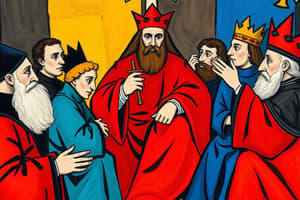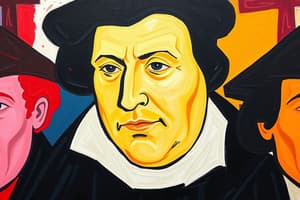Podcast
Questions and Answers
What was the Society of Jesus primarily established for?
What was the Society of Jesus primarily established for?
- To investigate corruption within the church
- To promote the sale of indulgences
- To reform the papacy directly
- To spread Catholicism through education (correct)
Which of the following was NOT a result of the Reformed Papacy?
Which of the following was NOT a result of the Reformed Papacy?
- Formation of the Council of Trent
- Creation of an Index of Prohibited Books
- Prohibition of marriage for clergy (correct)
- Establishment of the Inquisition
What was a significant outcome of the Council of Trent?
What was a significant outcome of the Council of Trent?
- Only faith was declared necessary for salvation
- Both faith and good works were deemed necessary for salvation (correct)
- The church acknowledged the authority of the Protestant movement
- The interpretation of scripture was opened to all believers
How did the Catholic Reformation differ from the Counter Reformation according to some historians?
How did the Catholic Reformation differ from the Counter Reformation according to some historians?
What did the term 'Counter Reformation' signify in relation to the Protestant movement?
What did the term 'Counter Reformation' signify in relation to the Protestant movement?
What was Desiderius Erasmus's belief regarding salvation?
What was Desiderius Erasmus's belief regarding salvation?
What was Luther's main criticism regarding indulgences?
What was Luther's main criticism regarding indulgences?
What was the outcome of the Peace of Augsburg?
What was the outcome of the Peace of Augsburg?
What did Luther post on the church door that criticized the selling of indulgences?
What did Luther post on the church door that criticized the selling of indulgences?
What was Calvinism's distinctive belief regarding salvation?
What was Calvinism's distinctive belief regarding salvation?
What prompted Luther to challenge the Catholic Church?
What prompted Luther to challenge the Catholic Church?
What did Frederick the Wise do for Luther?
What did Frederick the Wise do for Luther?
Which event marked the official start of the English Reformation?
Which event marked the official start of the English Reformation?
What was Luther's stance on the Peasants' War?
What was Luther's stance on the Peasants' War?
What aspect of social life did Protestants influence significantly?
What aspect of social life did Protestants influence significantly?
Who was the main leader of Zwinglianism in Switzerland?
Who was the main leader of Zwinglianism in Switzerland?
What did the Catholic Church fear during the Protestant Reformation?
What did the Catholic Church fear during the Protestant Reformation?
How did Calvin's teachings influence his followers?
How did Calvin's teachings influence his followers?
What was one result of the corruption in the Catholic Church before the Reformation?
What was one result of the corruption in the Catholic Church before the Reformation?
What belief does predestination represent?
What belief does predestination represent?
Which statement best describes Martin Luther's approach to religion?
Which statement best describes Martin Luther's approach to religion?
What was the main objective of Christian humanism during the Renaissance?
What was the main objective of Christian humanism during the Renaissance?
What was a key idea expressed in Machiavelli's 'The Prince'?
What was a key idea expressed in Machiavelli's 'The Prince'?
What impact did the decline of the landholding nobility have in the 15th century?
What impact did the decline of the landholding nobility have in the 15th century?
What was an effect of the social changes during the Renaissance?
What was an effect of the social changes during the Renaissance?
Which of the following statements about indulgences is true?
Which of the following statements about indulgences is true?
How did the new monarchies in France, England, and Spain aim to consolidate power?
How did the new monarchies in France, England, and Spain aim to consolidate power?
What did the term 'social changes in the Renaissance' refer to?
What did the term 'social changes in the Renaissance' refer to?
What was the attitude of landholding nobles towards their declining incomes during the Renaissance?
What was the attitude of landholding nobles towards their declining incomes during the Renaissance?
Which assertion reflects the view that the Renaissance monarchs had towards political power?
Which assertion reflects the view that the Renaissance monarchs had towards political power?
What role did grievances of peasants play during the Reformation?
What role did grievances of peasants play during the Reformation?
What was the primary focus of urban areas' population in the 15th century?
What was the primary focus of urban areas' population in the 15th century?
Flashcards
Counter Reformation
Counter Reformation
A movement within the Catholic Church in response to the Protestant Reformation, aimed at strengthening Catholicism.
Society of Jesus
Society of Jesus
A religious order, also known as the Jesuits, focused on education and spreading the Catholic faith.
Reformed Papacy
Reformed Papacy
The Catholic Church's effort during the Counter-Reformation to address corruption and injustices under previous popes.
Council of Trent
Council of Trent
Signup and view all the flashcards
Inquisition
Inquisition
Signup and view all the flashcards
Predestination
Predestination
Signup and view all the flashcards
Indulgence
Indulgence
Signup and view all the flashcards
Protestant Reformation
Protestant Reformation
Signup and view all the flashcards
New Monarchies
New Monarchies
Signup and view all the flashcards
Machiavelli
Machiavelli
Signup and view all the flashcards
"The Prince"
"The Prince"
Signup and view all the flashcards
Christian Humanism
Christian Humanism
Signup and view all the flashcards
Martin Luther
Martin Luther
Signup and view all the flashcards
Religious Relics
Religious Relics
Signup and view all the flashcards
Social Changes in the Renaissance
Social Changes in the Renaissance
Signup and view all the flashcards
Landholding nobles
Landholding nobles
Signup and view all the flashcards
Peasants
Peasants
Signup and view all the flashcards
Urban areas
Urban areas
Signup and view all the flashcards
Renaissance Monarchs
Renaissance Monarchs
Signup and view all the flashcards
Justification by Faith
Justification by Faith
Signup and view all the flashcards
95 Theses
95 Theses
Signup and view all the flashcards
Catholic Reformation
Catholic Reformation
Signup and view all the flashcards
Peace of Augsburg
Peace of Augsburg
Signup and view all the flashcards
Luther
Luther
Signup and view all the flashcards
Excommunication
Excommunication
Signup and view all the flashcards
English Reformation
English Reformation
Signup and view all the flashcards
Calvinism
Calvinism
Signup and view all the flashcards
Zwinglianism
Zwinglianism
Signup and view all the flashcards
Peasants' War
Peasants' War
Signup and view all the flashcards
Charles V
Charles V
Signup and view all the flashcards
Frederick the Wise
Frederick the Wise
Signup and view all the flashcards
Henry VIII
Henry VIII
Signup and view all the flashcards
Study Notes
Reformation: Unboxing the Terms
- Predestination: Belief that God predetermined whether a person would be saved or damned.
- Indulgence: A remission, after death, of all or part of the punishment due to sin.
Protestant Reformation Summary
- A religious reform movement that divided the Western Christian church into Catholic and Protestant groups.
Background to the Reformation: Growth of State Power
- In the second half of the 15th century, there were attempts to reestablish centralized power in monarchical governments.
- "New monarchies" emerged in France, England, and Spain, aiming to:
- Suppress the nobility.
- Control the church.
- Obtain new revenue sources for increased royal power.
- Enhance military forces.
- Renaissance monarchs focused on acquiring and expanding political power.
Niccolo Machiavelli
- An Italian diplomat, author, and philosopher.
- Author of "The Prince," a highly influential work on political power in the Western world.
Social Changes in the Renaissance
- Landholding nobles experienced declining incomes and populations.
- Peasants formed the overwhelming mass of the population in urban areas (85-90%).
- The population of serfs decreased as labor dues were increasingly converted into monetary payments.
- By 1500, Peasants gained legal freedom, but resented their superiors and sought more benefits from their labor.
- Grievances of peasants and the poor led many to support religious reform movements.
Middle Ages & Machiavelli
- In the Middle Ages, a prince's ethical activity was based on Christian moral principles.
- Machiavelli contradicted this belief, arguing the gap between ideal and actual behavior is substantial.
- He stated that rulers should focus on achieving results regardless of the methods, often prioritizing ends over means.
Prelude to Reformation: Christian Humanism
- The major goal of Christian humanism was to reform Christendom.
- Believed human beings had the ability to reason and improve themselves.
- Wanted to instill an inner religious feeling through education in classical and Christian antiquity.
- Believed that human beings must change themselves before changing society.
Martin Luther and Reformation
- A monk and professor who focused on studying the Bible.
- Based his ideas on Biblical teachings.
- Criticized the widespread sale of indulgences.
- Believed that salvation came through faith alone, not good works.
Religious Relics
- Remains or objects associated with saints were believed to offer indulgences.
- People believed collecting relics provided spiritual benefits.
Indulgences
- Certificates granted by the Church that purportedly lessened time spent in purgatory after death.
95 Theses
- Written by Martin Luther and posted on the door of the church.
- Criticized abuses and crimes related to the selling of indulgences.
Spread of Protestant Reformation: Zwinglianism
- Led by Ulrich Zwingli in Switzerland.
- Emphasized the removal of religious relics and images in the church.
Spread of Protestant Reformation: Calvinism
- Founded by John Calvin in Switzerland.
- Emphasized God's absolute sovereignty and predestination.
- Believed only certain people would be saved.
- Calvin began reforming the city of Geneva in 1536.
English Reformation
- Rooted in politics, not religion.
- King Henry VIII sought a divorce from Catherine of Aragon to marry Anne Boleyn.
- Established the Church of England.
Social Impact of Protestant Reformation
- Protestants developed a new perspective on the family.
Catholic Reformation
- A response to the Protestant Reformation.
- The Catholic Church was concerned about the spread of Protestantism in Europe.
- The Catholic Church attempted to reform itself in response to the Protestant Reformation.
- Catholic reformation also took place in efforts to reconcile with Protestant groups.
Catholic Reformation: Society of Jesus (Jesuits)
- Religious order that promoted education to spread Catholicism.
Catholic Reformation: Reformed Papacy
- Pope Paul III established a Reform Commission to investigate the corruption and injustices of Renaissance popes.
- Employed the Inquisition to combat heresy.
- Published the Index of Prohibited Books.
- Convened the Council of Trent.
Catholic Reformation: Council of Trent
- Representatives from the Catholic Church met to discuss Catholic doctrines and practices.
- Reaffirmed traditional Catholic teachings.
- Declared that faith and good works were necessary for salvation.
Studying That Suits You
Use AI to generate personalized quizzes and flashcards to suit your learning preferences.




